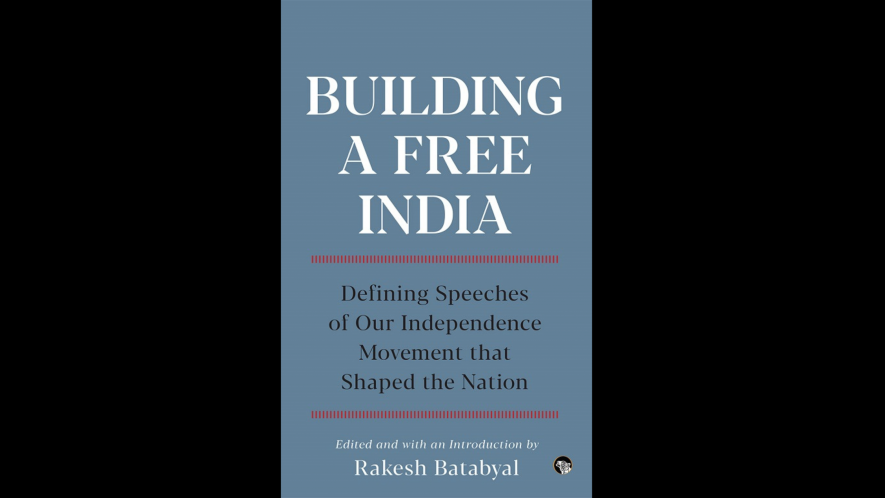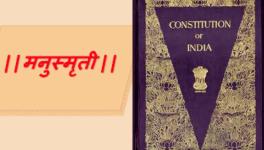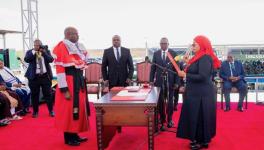Building a Free India: Defining Speeches of Our Independence Movement That Shaped the Nation

Image courtesy Speaking Tiger Books
As India’s freedom movement progressed—from the economic critique of colonial rule by the early nationalists, to the unequivocal demand for Purna Swaraj and the immense moral authority of the Mahatma Gandhi-led resistance—the notion of an equal society that ensured dignity to all—irrespective of caste, class, gender or religion—came to occupy a central place in it. By the time the Constituent Assembly met in December 1946, not just civil rights, but the particular rights of women, of minorities, of the Depressed Classes and the Adivasis were being articulated and demanded, not as favours but as a matter of course. As the editor of this volume writes in his brilliant introduction, the effect of the speeches delivered by the leaders of our national movement was to focus ‘political action towards scripting an ennobling nationalism that would give us a just and equal society’.
Edited by Rakesh Batabyal, Building a Free India brings together these landmark speeches delivered over roughly a century by the leading lights of the national movement—from Dadabhai Naoroji, Surendranath Banerjee, Bhikaiji Cama, Lajpat Rai and Tilak, to Gandhi, Nehru, Ambedkar, Bose, Sarojini Naidu and Maulana Azad—as well as a range of lesser-known but equally remarkable figures. This unprecedented collection is not only an invaluable history of our freedom movement but also of the ideas of universal equality, dignity and justice that are—and must always remain—at the root of our democracy.
On the Criticism of the Draft Constitution
– Bhimrao Ramji Ambedkar
As chairman of the Drafting Committee of the Constituent Assembly, Ambedkar had to appear before the Assembly regularly for responding to comments and suggestions of the members. His responses on all such occasions were measured but confident and decisive. The speech excerpted here, delivered on 4 November 1948, was one of his most comprehensive speeches in owning the Draft Constitution where he defends it against detractors who criticized it for being a copy-and-paste job and generally being unoriginal. Ambedkar foregrounded his rebuttal with the universality of the idea of a constitution, arguing that if they had merit and served their purpose, there was no harm borrowing provisions of another constitution. A critic of the vacuous ideas of indigeneity, his view of modernity was premised on the universal ideas of modern citizenship, which to him required good constitutional provisions.
[…]
Some critics have taken objection to the description of India in Article 1 of the Draft Constitution as a Union of States. It is said that the correct phraseology should be a Federation of States. It is true that South Africa which is a unitary State is described as a Union. But Canada which is a Federation is also called a Union. Thus the description of India as a Union, though its constitution is Federal, does no violence to usage. But what is important is that the use of the word Union is deliberate. I do not know why the word ‘Union’ was used in the Canadian Constitution. But I can tell you why the Drafting Committee has used it. The Drafting Committee wanted to make it clear that though India was to be a federation, the Federation was not the result of an agreement by the States to join in a Federation and that the Federation not being the result of an agreement no State has the right to secede from it. The Federation is a Union because it is indestructible. Though the country and the people may be divided into different States for convenience of administration the country is one integral whole, its people a single people living under a single imperium derived from a single source. The Americans had to wage a civil war to establish that the States have no right of secession and that their Federation was indestructible. The Drafting Committee thought that it was better to make it clear at the outset rather than to leave it to speculation or to dispute.
The provisions relating to amendment of the Constitution have come in for a virulent attack at the hands of the critics of the Draft Constitution. It is said that the provisions contained in the Draft make amendment dificult. It is proposed that the Constitution should be amendable by a simple majority at least for some years. The argument is subtle and ingenious. It is said that this Constituent Assembly is not elected on adult suffrage while the future Parliament will be elected on adult suffrage and yet the former has been given the right to pass the Constitution by a simple majority while the latter has been denied the same right. It is paraded as one of the absurdities of the Draft Constitution. I must repudiate the charge because it is without foundation. To know how simple are the provisions of the Draft Constitution in respect of amending the Constitution one has only to study the provisions for amendment contained in the American and Australian Constitutions. Compared to them those contained in the Draft Constitution will be found to be the simplest. The Draft Constitution has eliminated the elaborate and difficult procedures such as a decision by a convention or a referendum. The Powers of amendment are left with the Legislature Central and Provincial. It is only for amendments of specific matters—and they are only few—that the ratification of the State legislatures is required. All other Articles of the Constitution are left to be amended by Parliament. The only limitation is that it shall be done by a majority of not less than two-thirds of the members of each House present and voting and a majority of the total membership of each House. It is dificult to conceive a simpler method of amending the Constitution.
What is said to be the absurdity of the amending provisions is founded upon a misconception of the position of the Constituent Assembly and of the future Parliament elected under the Constitution. The Constituent Assembly in making a Constitution has no partisan motive. Beyond securing a good and workable constitution it has no axe to grind. In considering the Articles of the Constitution it has no eye on getting through a particular measure. The future Parliament if it met as a Constituent Assembly, its members will be acting as partisans seeking to carry amendments to the Constitution to facilitate the passing of party measures which they have failed to get through Parliament by reason of some Article of the Constitution which has acted as an obstacle in their way. Parliament will have an axe to grind while the Constituent Assembly has none. That is the difference between the Constituent Assembly and the future Parliament. That explains why the Constituent Assembly though elected on limited franchise can be trusted to pass the Constitution by simple majority and why the Parliament though elected on adult suffrage cannot be trusted with the same power to amend it.
I believe I have dealt with all the adverse criticisms that have been levelled against the Draft Constitution as settled by the Drafting Committee. I don’t think that I have left out any important comment or criticism that has been made during the last eight months during which the Constitution has been before the public. It is for the Constituent Assembly to decide whether they will accept the constitution as settled by the Drafting Committee or whether they shall alter it before passing it. But this I would like to say. The Constitution has been discussed in some of the Provincial Assemblies of India. It was discussed in Bombay, CP, West Bengal, Bihar, Madras and East Punjab. It is true that in some Provincial Assemblies serious objections were taken to the financial provisions of the constitution and in Madras to Article 226 [which would empower Parliament to enact for whole or part of the country laws on any subject enumerated in the State List in ‘national interest’ by a two-thirds majority—Ed.]. But excepting this, in no Provincial Assembly was any serious objection taken to the Articles of the Constitution. No Constitution is perfect and the Drafting Committee itself is suggesting certain amendments to improve the Draft Constitution. But the debates in the Provincial Assemblies give me courage to say that the Constitution as settled by the Drafting Committee is good enough to make in this country a start with. I feel that it is workable, it is flexible and it is strong enough to hold the country together both in peace time and in war time. Indeed, if I may say so, if things go wrong under the new Constitution, the reason will not be that we had a bad Constitution. What we will have to say is, that Man was vile. Sir, I move.
This is an excerpt from Building a Free India: Defining Speeches of Our Independence Movement That Shaped the Nation (2022), edited by Rakesh Batabyal and published by Speaking Tiger Books. Republished here with permission from the publisher.
Rakesh Batabyal teaches the history, theory and philosophy of media at the Centre for Media Studies, JNU. A scholar of modern history, his books, Communalism in Bengal: From Famine to Noakhali,1943–47 (2005), JNU: The Making of a University (2015), and The Modern School (1920–2020): A Century of Schooling in India (2020), have provided a framework for the writing of the history of ideology and institutions in modern India. The Inaugural Indian Chair Professor at the School of Information Studies, Tokyo University, Batabyal is presently working on a book on the history of nationalism in India.
Get the latest reports & analysis with people's perspective on Protests, movements & deep analytical videos, discussions of the current affairs in your Telegram app. Subscribe to NewsClick's Telegram channel & get Real-Time updates on stories, as they get published on our website.
























